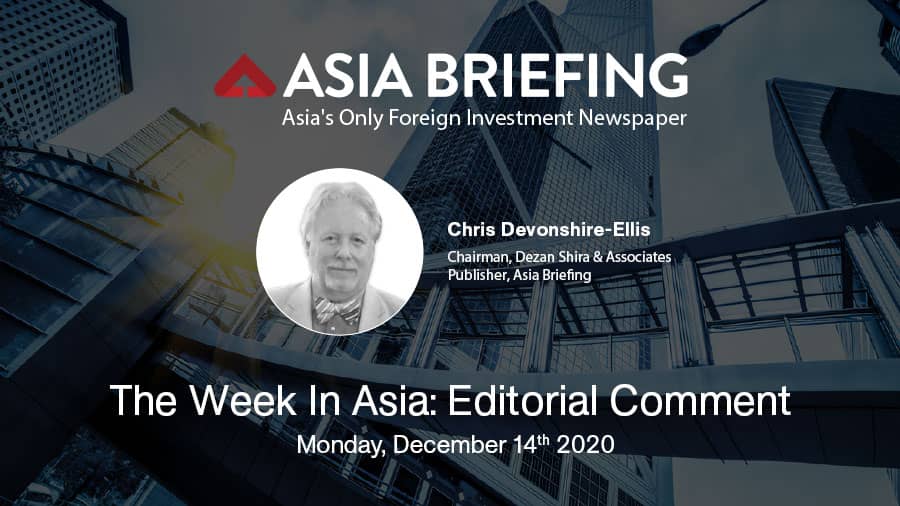
As I write this week’s editorial on Sunday afternoon (yesterday), the fate of the relationship between the UK and European Union appears in the balance, with a ‘deadline’ expected at midnight. Apparently there is an 80% chance of a “no-deal” Brexit, although I expect some fudging over that and for talks to continue up until December 31st, in what long ago became a tedious trade saga with little political will other than to disagree. (note: this is exactly what happened, talks are set to continue).
Whatever happens, it is quite apparent that political leaders on both sides of the debate are failing. While the British are an island nation and long given to a siege-type mentality as a result, the fallout for the EU is rather more serious. To be run by politicians who have deliberately shunned what had been a huge trade partner with Russia, overseeing the loss of bilateral trade volume of what was been a peak of €322 billion in 2012 to €183 billion in 2016, and then lose the second largest European economy in the UK as a member is the height of political stupidity and fiscal recklessness. At boardroom level such losses would have resulted in dismissals and the firings of CEOs and those responsible. Politicians manage to carry on regardless.
While the UK will have to reinvent itself and try not to become beholden to the United States’s wishes as a trade partner, the EU is left with serious internal divisions, including political suspicions concerning China. It’s the ancient political trick – when things aren’t going too well at home, blame the foreigners.
While last week I warned against the overly political views being displayed by the European Chamber of Commerce in China – which really should be operating as a trade body and assisting EU businesses conduct trade with China rather than spouting off its Parliamentarians viewpoints, the fact remains that the majority of British and European businesses would rather go about their business without political meddling. These days, it is quite apparent that business with China and Asia continues despite their politicians ravings, and not because of any notable political deftness. For that we must be grateful for the cool corporate heads responsible for keeping trade on track. Business leaders in Europe and the UK have been shown to be far more pragmatic than their political counterparts, and that puts them more on a par with the local political nuances of doing business in the Asian region as a result..
The UK this week signed Free Trade Agreements with Singapore and Vietnam, an issue we covered on Friday in the article The End Of Britain’s EU Transition Period Is Set To Boost Economic Ties With Asia. In fact, British trade with Asia is growing at a faster rate than either with the EU or United States, and this is a sign of trends to come. A quietly noticed landmark was reached this year when Asian economies actually became larger than Western ones for the first time since the 19th century. Not only is Asia growing richer; as it becomes more integrated, it is also coalescing as a constructive force for global governance.
Asia is also bucking the global trend for trade fragmentation, becoming instead ever more economically integrated via trade and investment. Today, Asia is at the heart of the action for multilateral trade liberalization. Abandoned by the US, the reformed Trans-Pacific Partnership (TPP) has become the Comprehensive and Progressive Agreement for Trans-Pacific Partnership (CPTPP) coming into force at the start of last year. While Covid-19 has interrupted its immediate impact, the ball continues to roll, with the Regional Comprehensive Economic Partnership (RCEP) being agreed just last month. These agreements will continue to evolve and will attract new members, offering a flexible, multi-track path to economic integration in Asia. For example, the more rigorous CPTPP can help to set standards for future trade for advanced economies, while the less-demanding RCEP will offer a way for developing countries to participate in free trade.
Knitting together infrastructure initiatives, trade pacts and other groupings will boost pan-Asian coordination on connectivity and trade liberalization. In turn, this can help fuel a virtuous cycle of mutual gain and closer integration. A more integrated Asian community – one that brings together developed and developing countries and various economic systems – will also provide the momentum to reinvigorate multilateralism at the global level. Solutions that have been adapted to Asia’s diverse conditions may well prove to be useful templates for the rest of the world.
For that reason, the UK may yet be able to dig itself out of the EU no-deal hole that it is finding itself scrambling to get out of. The same should also prove to be the same for EU and indeed US businesses. Losing both Russia and the United Kingdom as markets may have been reckless. Needlessly bankrupting numerous American sourcing businesses in China selling cheap goods at markups attracting US fiscal revenues back in the United States was additionally stupid. Fortunately, Asia is unencumbered by such political recklessness and its politicians have a better grasp of business realities.
As my colleague Marcos Salgado Sanchez, in his editorial this week states, ASEAN is a place for businesses to be looking at for growth in 2021, and that will continue to be the theme for British, European and American investors looking to get out of the unholy trade mess their respective politicians have driven them into. 2021 then promises to be a year of business development rather than political arguments, and if so, gives us all the luxury of a huge sigh of relief.
Elsewhere on Asia Briefing this week, we have as special features an overview of recent developments and opportunities in Singapore, and take a look at the developing trade corridor between China and Russia. Our news sections meanwhile are updated on a daily basis, so be sure to drop in and check out the latest each afternoon.
Stay safe!
Best regards;

Chris Devonshire-Ellis
Chairman, Dezan Shira & Associates
Publisher, Asia Briefing
E: editor@asiabriefing.com
W: www.dezshira.com
Disclaimer
Any views or opinions represented in this blog are personal commentary, belong solely to the contributor and do not necessarily represent the views of Asia Briefing Limited or Dezan Shira & Associates.


